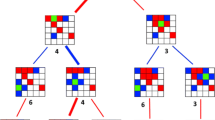Abstract
This paper pioneers the avenue of enhancing a well-known paradigm in game playing, namely the use of History-based heuristics, with a totally-unrelated area of computer science, the field of Adaptive Data Structures (ADSs). It is a well-known fact that highly-regarded game playing strategies, such as alpha-beta search, benefit strongly from proper move ordering, and from this perspective, the History heuristic is, probably, one of the most acclaimed techniques used to achieve AI-based game playing. Recently, the authors of this present paper have shown that techniques derived from the field of ADSs, which are concerned with query optimization in a data structure, can be applied to move ordering in multi-player games. This was accomplished by ranking opponent threat levels. The work presented in this paper seeks to extend the utility of ADS-based techniques to two-player and multi-player games, through the development of a new move ordering strategy that incorporates the historical advantages of the moves. The resultant technique, the History-ADS heuristic, has been found to produce substantial (i.e, even up to 70%) savings in a variety of two-player and multi-player games, at varying ply depths, and at both initial and midgame board states. As far as we know, results of this nature have not been reported in the literature before.
B.J. Oommen—Chancellor’s Professor; Fellow: IEEE and Fellow: IAPR. The second author is also an Adjunct Professor with the Dept. of ICT, University of Agder, Grimstad, Norway.
Access this chapter
Tax calculation will be finalised at checkout
Purchases are for personal use only
Preview
Unable to display preview. Download preview PDF.
Similar content being viewed by others
References
Russell, S.J., Norvig, P.: Artificial Intelligence: A Modern Approach, 3rd edn., pp. 161–201. Prentice-Hall Inc., Upper Saddle River (2009)
Knuth, D.E., Moore, R.W.: An analysis of alpha-beta pruning. Artificial Intelligence 6, 293–326 (1975)
Schaeffer, J.: The history heuristic and alpha-beta search enhancements in practice. IEEE Transactions on Pattern Analysis and Machine Intelligence 11, 1203–1212 (1989)
Reinefeld, A., Marsland, T.A.: Enhanced iterative-deepening search. IEEE Transactions on Pattern Analysis and Machine Intelligence 16, 701–710 (1994)
Gonnet, G.H., Munro, J.I., Suwanda, H.: Towards self-organizing linear search. In: Proceedings of FOCS 1979, the 1979 Annual Symposium on Foundations of Computer Science, pp. 169–171 (1979)
Hester, J.H., Hirschberg, D.S.: Self-organizing linear search. ACM Computing Surveys 17, 285–311 (1985)
Albers, S., Westbrook, J.: Self-organizing data structures. In: Fiat, A., Woeginger, G.J. (eds.) Online Algorithms 1996. LNCS, vol. 1442, pp. 13–51. Springer, Heidelberg (1998)
Polk, S., Oommen, B.J.: On applying adaptive data structures to multi-player game playing. In: Proceedings of AI 2013. Thirty-Third SGAI Conference on Artificial Intelligence, pp. 125–138 (2013)
Schadd, M.P.D., Winands, M.H.M.: Best Reply Search for multiplayer games. IEEE Transactions on Computational Intelligence and AI in Games 3, 57–66 (2011)
Polk, S., Oommen, B.J.: On enhancing recent multi-player game playing strategies using a spectrum of adaptive data structures. In: Proceedings of TAAI 2013, the 2013 Conference on Technologies and Applications of Artificial Intelligence (2013)
Schaeffer, J., Burch, N., Bjornsson, Y., Kishimoto, A., Muller, M., Lake, R., Lu, P., Sutphen, S.: Checkers is solved. Science 14, 1518–1522 (2007)
Polk, S., Oommen, B.J.: Novel AI strategies for multi-player games at intermediate board states. In: Ali, M., Kwon, Y.S., Lee, C.-H., Kim, J., Kim, Y. (eds.) IEA/AIE 2015. LNCS, vol. 9101, pp. 33–42. Springer, Heidelberg (2015)
Author information
Authors and Affiliations
Corresponding author
Editor information
Editors and Affiliations
Rights and permissions
Copyright information
© 2015 Springer International Publishing Switzerland
About this paper
Cite this paper
Polk, S., Oommen, B.J. (2015). Enhancing History-Based Move Ordering in Game Playing Using Adaptive Data Structures. In: Núñez, M., Nguyen, N., Camacho, D., Trawiński, B. (eds) Computational Collective Intelligence. Lecture Notes in Computer Science(), vol 9329. Springer, Cham. https://doi.org/10.1007/978-3-319-24069-5_21
Download citation
DOI: https://doi.org/10.1007/978-3-319-24069-5_21
Published:
Publisher Name: Springer, Cham
Print ISBN: 978-3-319-24068-8
Online ISBN: 978-3-319-24069-5
eBook Packages: Computer ScienceComputer Science (R0)




